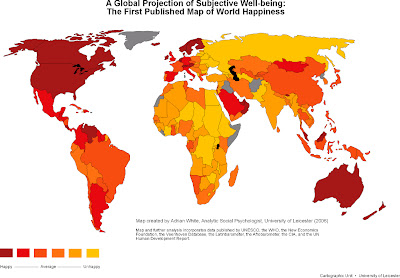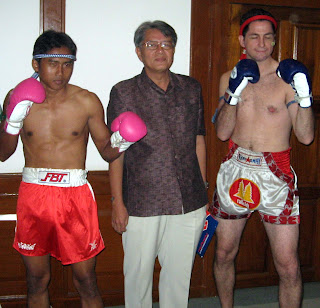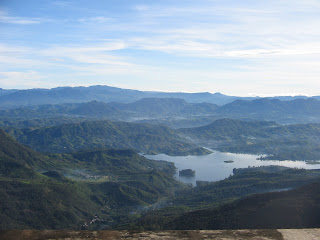
I flew out of the new airport in Bangkok on an Air Asia budget flight that cost me around $60 and took no-frill flying to a whole new level. You pay for everything on the flight from water to a pillow.
It's always struck me as odd how people line up to board their flights at the first opportunity. I've even seen pushing and shoving. Why bother when you have an assigned seat? I've always wondered. I'm not in a hurry to get packed onto a small space for a few hours, so I hang back and consequentially end up sandwiched in between two guys who chat over me the whole flight. Air Asia doesn't have assigned seats. It's a free for all. Delightful.
I arrived in the early hours of the morning. The airport was smaller than I had expected and there was only one ATM machine. It was out of order. I gave up on travellers cheques and changing money when I was about 18 and rely on airport ATMs for my in country cash entirely. I had Thai baht as a back up, but it seemed like I was stuck. Woops.
I convinced a bus company heading for "Sentral KL" to take the Thai money and give me a ticket. My guidebook told me that the buses heading for downtown will drop you pretty much anywhere and certainly at the guesthouses in China Town, which is where I wanted to stay. Had I been just a little more attentive, I would have realised that Sentral is not a synonym for downtown, but rather the name of the main train station, just north of the city centre. I was dropped there at 1:30am with no local currency on me.
Luckily, the station was open and I wandered past the security guards into the dark hall. I was in luck. I quickly located a bank of three ATMs. One had a large sign proclaiming no international service. The other had an out-of-service message blinking on the screen and the third, although initially promising, spat out my card with a message that the international banking link was down. So sorry.

It was 2am. I contemplated my options. I realised I hadn't eaten in a long time. I had no money for food. Finally I found a cab and asked the driver to take me to a big bank with ATM machines. It took me about ten minutes of wrestling with the machine to get it to give me a pitiful amount. I don't know why I was having so many problems. The taxi driver dropped me at the hotel and I handed him the cash. In my mind I was trying to convert to Thai money. The driver looked at me strangely.
"Is it ok?" I asked him, thinking perhaps I had messed it up.
He smiled and nodded and drove off. I checked into the hotel and fell onto the bed, sweaty and tired, just wanting to sleep. That's when it hit me. I had just given the taxi driver 10 times the amount I was supposed to. I thought about it further. If my banking troubles continued, I wouldn't be able to withdraw enough to pay for the visa I had come there for.
It took me a long time to get to sleep. I just lay there feeling stupid and embarrassed and stupid again. I swore a lot, tossed and turned and swore some more.
The next morning, determined to shake my bad mood, I wandered the streets of China Town, looking for breakfast. I settled on a small Malay restaurant with a menu that I could point to and ordered something. I ended up with a plate of fried rice and breathed in relief. Safe food. What can go wrong eating fried rice? The rice was yellow, spiced and delicious. Big chunks of vegetables littered the plate along with tender morsels of chicken, but suddenly I paused. It didn't taste good, it didn't taste very good at all.

Malaysian food is famous for satay and it seems I was not safe, even eating fried rice. The chicken chunks I had been enjoying were going to be the death of me, if I wasn't careful. I swallowed some pills quickly and left, trying to ignore to man at the counter glaring at the plate full of food I had left behind.
I have to admit, the two incidents weakened my sense of adventure considerably. As did my ongoing problems applying for the visa I had come for. I spent the rest of my time in Kuala Lumpur trying to salvage the trip.
The first day, I just walked. I walked to the old train station and admired the white minarets and architecture. I wandered under the palms past gorgeous mosques, listening to the call to prayer. I felt the heat of the streets and sat in the shade to watch all the people pass. If I could show you the map of the city and where I walked, I walked clear across the place in a day, getting sore and sunburned.

I walked past the famous KL Towers, the largest in the world (sorry Toronto) and out to the Thai embassy.
I walked around the bourgeois refurbished Central Market crammed with its tourist goods and all the way out to Chow Kit where people really buy things. No matter where I am in the world, I have yet to find a market I haven't liked. I love the crowded rows between stalls, the shout of vendors touting their wares, the smells that sneak up on you unaware, wafts of dried ginger and chili and pungent dried fish.

The next day was just more problems at the embassy, so I spent the afternoon getting out of the city. I took a bus to the Bantu Caves, a Hindu sacred site in some picturesque limestone mountains. It was nice just to get out of the city for a while.
There are almost three hundred steps leading up to the main cave, watched over by a large golden statue. Each step is numbered and I intended to make a thoughtful climb, aware of each step as I made it.
I was quickly distracted by the monkeys, however. I hope I am never in such a black pit of despair that monkeys and their antics can't make me smile. I know they are pests and they bring endless annoyance to people, but I'm a tourist and monkeys never cease to make me laugh and bring me joy.
In addition, the caves

were spectacular. Particularly when I lay on my back on the marble floor of one of the Hindu shrines in the back and stared up the shapes hanging from the ceiling, getting the tacky paintings and litter on the floor out of my field of view. In the very back, the roof opened up to the sky and there were monkeys up there too, swinging from vines in the jungle far above, and petals drifting down in the breeze.
I got out of the city the next day and headed North to an island near the border with Thailand. I went to a number of guesthouses looking for a nice one and on the way seeing some very dodgy establishments. In one little house tucked in the back of a lovely garden courtyard, a very large man sat behind a counter, looking exactly like Jabba the Hut, the younger version. Not only did the man have a round shiny belly which could not be confined by his shirt, he also had this strange triangular tongue which continually flicked around outside his mouth as he talked with me. I didn't stay there.
Actually the island of Penang doesn't have much to recommend it. It's a quiet little town whose main attraction is the ease in getting visas into Thailand. I enjoyed it though. The cultural influences are more Chinese and Indian than Malay. There are Chinese temples and clan houses and a whole section of town with Indian tea and clothes and music. On my own, I loved exploring the book shops and cafes. But the main draw is, of course, the food.

My partner joined me the next day and we proceeded to gorge ourselves silly. He had recently been to India, and I Sri Lanka, so we both fell upon the Indian food with a vengeance. The tandoori chicken was especially fantastic but another night we ate at a small place with big vats of chicken masala, honey chicken, fragrant rice and roasting nan bread.
Then there was the Chinese cuisine. We settled into a round table at a busy dim sum restaurant, drinking pot after pot of green tea and grabbing treats off the cart every time it went by. I don't even know the names of all the things we ate there.
One day we took a bus out to the beach. The bus was slow and the trip to the Northern part of the island seemed to take forever. We ended up in a fishing village, walking along a grey beach lined with little boats and nets and restaurants serving seafood. We walked out along a long pier to look at the boats and stared down at the jellyfish in the water.
The beach was far from spectacular. The sand was somewhat grey and the water not at all enticing. Despite the incredible heat and our constant sweating, there was no question of going for a swim. A few families hid in the shade by no one approached the water.
The way back to Thailand was long. We caught the ferry back to the Malaysian mainland and then caught a train. The train ride was perhaps 20 hours to Bangkok. The seats and sleeping berths were very comfortable and the hours passed comfortably, rubber trees flying by outside the window, drinking beer, reading the newspaper, playing cards.
For a while, after coming back, Thailand seemed less hot. Unfortunately it didn't take long to catch up, and we are now in the middle of hot season. I'm writing from my wooden house, under the fan, sweating like crazy. It'll be a while before I get another beach vacation, but I think it's the perfect time for myself to go jump in the reservoir.
 It’s an amazing country, the one I recently visited at the end of March. For two weeks I lived in a kind of 1984 world, where DoubleSpeak is an important element to every day life, propaganda is rife and cars with steering wheels on the left side share the road with cars with steering wheels on the right side.
It’s an amazing country, the one I recently visited at the end of March. For two weeks I lived in a kind of 1984 world, where DoubleSpeak is an important element to every day life, propaganda is rife and cars with steering wheels on the left side share the road with cars with steering wheels on the right side. me for security’s sake: conversations with people, meetings, chance encounters even, names, dates, anything too specific.
me for security’s sake: conversations with people, meetings, chance encounters even, names, dates, anything too specific. never maintained. Colonial ruins stand beside ancient rubble and Chinese concrete constructions tower above them all.
never maintained. Colonial ruins stand beside ancient rubble and Chinese concrete constructions tower above them all.  I saw simple acts of kindness which are committed with a kind of routine nonchalance that inspired me. I found all kinds of examples of people with very little sharing with they had with others who had less. I’m under no idyllic impression that the humanity residing in this one particular country are somehow ideal or blessed, but I saw in my short experience there echoes of what I see in many people here in my work: a charity which truly comes from the heart.
I saw simple acts of kindness which are committed with a kind of routine nonchalance that inspired me. I found all kinds of examples of people with very little sharing with they had with others who had less. I’m under no idyllic impression that the humanity residing in this one particular country are somehow ideal or blessed, but I saw in my short experience there echoes of what I see in many people here in my work: a charity which truly comes from the heart. 












































